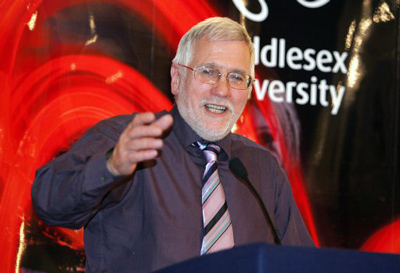
In Memoriam Robin Wensley
Professor Robin Wensley
The Academy is deeply saddened to announce the passing of our esteemed colleague and friend, Professor Robin Wensley, who died on the 29th September 2022. Robin’s humour, humanity, intellect, and leadership will be sadly missed by many within the Academy.

Biography
After reading Natural Sciences at Cambridge and working for a time in industry, Robin completed his master’s degree at London Business School. Delivering executive education at Ashridge was his first foray into academe. Soon after, he became a lecturer at London Business School, before going on to complete his PhD there. In 1986, Robin was appointed as professor at the University of Warwick, where he remained throughout the rest of his working life. He served as Chair of Warwick Business School from 1989 to 1994 and was Chair of the Faculty of Social Studies from 1997 to 1999. After a stint as a Board member of the ESRC Research Grants Board between 1991 and 1995, Robin was appointed to the Council of the ESRC from 2001. Between 2004 and 2011, he was Director of the prestigious £30m ESRC/EPSRC AIM Research initiative, a role that played to his interests in bridging the gap between academe and practice.
Robin was a great networker, who loved to travel, enjoying sabbaticals at UCLA (twice) and the University of Florida, amongst others; visits he would recollect with great fondness. He forged strong and enduring research and writing collaborations with academics who inspired him, advising others to “work closely with colleagues who have challenging and different perspectives” (Wensley, 2017, pp. 302). He was also Chair of the Council of the Tavistock Institute of Human Relations from 1998 until 2003 and a member of the Sunningdale Institute between 2008 and 2011. After his retirement from Warwick, Robin continued his academic interests through a fractional post at the Open University, an institution he admired for its social justice agenda and for making education accessible to those who might not otherwise be able to study.
Before entering academe, Robin worked at RHM Foods and Tube Investments, a period in his life which underpinned an ongoing fascination with management practice, an interest he continued to pursue through undertaking consultancy and management development for many major organisations. Robin was particularly interested in the translation and application of knowledge in practice, and in the challenges involved in achieving impact. These he put down to the heterogeneity of both management research and its audiences, arguing for creative approaches that make considered use of language and arguments, to meet the needs of each audience.
Prestigious achievements
Robin achieved many prestigious accolades during his career. He was a Fellow of the British Academy of Management (FBAM), the Chartered Institute of Marketing (FCIM) and the Academy of Social Sciences (FAcSS). In 2006, he was awarded the Academy of Marketing’s Lifetime Achievement Award. He received the British Academy of Management Richard Whipp Lifetime Achievement Award in 2012. His significant contributions to strategic marketing were recognised by twice winning the prestigious Journal of Marketing Alpha Kappa Psi award for best paper; in 1981 for his paper Betas, Boxes or Basics; and in 1988 for his paper with George Day on Assessing Advantage. He also won the Millennium Prize for the best paper in the Journal of Marketing Management.
Beyond these personal contributions, Robin was a democratic and highly effective academic leader, as well as an inspirational mentor. He was especially committed to nurturing the careers of the next generation of business and management academics, devoting vast amounts of time and energy to supporting his doctoral students and to those who were early in their careers.
Academic outlook
Robin had a rare intellect and an irrepressible intellectual curiosity. He was exceptionally well read and could quote with ease from sources that inspired him. He was naturally inquisitive, with an innate ability to view problems from different angles. And long before it became trendy, Robin was interdisciplinary in his thinking and in his approach to his research. Reflecting his eclectic interests, Robin’s first office at Warwick was stacked high with books and papers, interspersed with handwritten pages. The brilliant insights these sheets contained were recorded in his distinctive handwriting, which was illegible to all but the trained eye. ‘I really must sort this out….’, he would say when his office’s untidiness reached epic proportions, but I am not sure he ever did.
Describing his approach as ‘contrarian’, Robin drew on a panopoly of ideas in his research and writing, everything from post-Keynesian economics and option pricing theory, to decision support systems, strategic investment decisions, and even the search for order in chaos. The great cook Mrs Beaton and Zen and the Art of Motorcycle Maintenance were particular favourites of his. His approach resulted in outcomes that invariably were original and sometimes surprising. In one of his last publications, Research in the gap between the obvious and the improbable, which appeared in the Journal of Historical Research in Marketing, he spoke about living in a world where, “There can be little doubt that we seem at the moment to be in a political economy where the obvious and the improbable actually co-exist, but it is difficult to work out which is which” (Wensley, 2017, pp. 315). How right he was.
Humanity and integrity
Above all, Robin was marked out by his humanity. He was charming and fun; his booming laugh would fill the corridors and his rueful smile was never far away. You knew when Robin was ‘in the building’ and the days when he was, were richer for it.
He was a man of great integrity, with a deeply rooted social conscience. Treating people with equanimity came naturally and he had time for everyone, irrespective of their career stage, profile, or where they fitted within the academic hierarchy. He was slow to judge and always respectful of people’s ability to know what was right for them.
Robin also loved to talk and in those wonderful conversations he gave his full and undivided attention. Ask him an interesting question and he would lean back in his chair, gaze into the distance in thoughtful contemplation, and then the cogs would start to whir. These discussions might last for hours; they were inspiring and developmental in equal measure, moments to benefit from his extraordinary intellect and really learn how to think.
Although Robin in full professorial flow was inspiring, he was also empathetic and understood the difficulties people face in their lives, going out of his way to help if he could. So many colleagues and friends have shared touching ‘Robin’ stories of moments when he helped them out of a fix or just took the time to listen. Such help would be offered without drama or fuss and with absolute discretion. There was never a price to be repaid later.
Family and home
Away from work, Robin was a great family man, a proud and devoted husband, father and grandfather. He liked travelling and walking, and relished time spent with his grandchildren. He was a great respecter of women, and his love and admiration for his wife, Sue, were readily evident. He needed little encouragement to speak with warmth and enthusiasm about his children and grandchildren and was clearly fascinated about who they were and would become.
Robin also loved his home and his beautiful garden, claiming in typical ‘Robin fashion’ that the green fingers were all Sue’s and that he simply provided the manual labour. Whatever the truth of the matter, the results were spectacular. He was also surprisingly practical for a professor! An able mechanic, who could strip down engines and an enthusiastic baker of bread, which he said he found enormously therapeutic.
Robin was an incredibly special human being. He touched many lives and leaves a community that will always be grateful for his wisdom, inspiration and academic legacy to marketing. But more than that, he was warm and funny, thoughtful and kind. The lives of so many of his friends and colleagues are richer for having known him. We will miss you, Robin.
Professor Sally Dibb, Coventry University
Wensley, Robin (2017). Research in the gap between the obvious and the improbable. Journal of Historical Research in Marketing, 9(3), pp. 302-318.